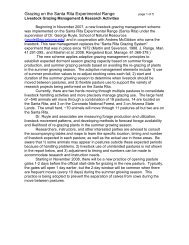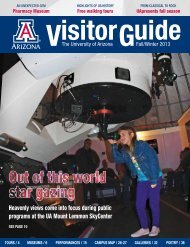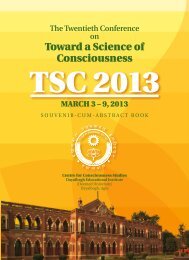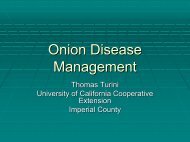CONSCIOUSNESS
Download - Center for Consciousness Studies - University of Arizona
Download - Center for Consciousness Studies - University of Arizona
- No tags were found...
You also want an ePaper? Increase the reach of your titles
YUMPU automatically turns print PDFs into web optimized ePapers that Google loves.
5. Experiential Approaches 199<br />
to clarify the different uses and modifications of the term “fantasy” in the course of the discoveries<br />
realized by Freud during his life long work. An analysis of the investigation revealed<br />
three descriptive complex principle themes, which at times can be contradictory, yielding<br />
and subjugating with constant redefinition, which characterizes the fantasy as a symptom,<br />
a creation and an enigma of generational transmission. Fantasy exists in various forms in<br />
psychism - including hallucinatory realization; trauma and erogenous function; psyche activities<br />
as symptom, creation and art; primordial fantasies as philogenesis and ontogenesis; as<br />
enshrouded memories; as infancy sexual investigation and as consolation: the daydreams,<br />
the make believe. The conclusion corroborates the presumption that life does not make sense<br />
without the capacity to fantasize. The fantasy: occupies a place of fundamental importance in<br />
Freudian thought; presents as an essential element in the constitution of psychism and reveals<br />
horizons for researchers of psychoanalysis to amplify their investigations leading to further<br />
revealing of the psyche. At this time, the thoughts regarding Freud’s Works are completely<br />
contemporary. P11<br />
301 The Potential Therapeutic Benefit of Mediumship Readings in the Treatment of<br />
Grief Chad Mosher, Julie Beischel, PhD; Mark Boccuzzi <br />
(The Windbridge Institute, Tucson, AZ)<br />
Grief is a natural experience among people of every culture. Unresolved or complicated<br />
grief, however, can yield detrimental effects for some individuals including increased morbidity<br />
and mortality (e.g., Schaefer et al., 1995; Shahar et al., 2001; Stroebe et al., 2007).<br />
Over the past four decades, stage models of grief were posited (e.g., Kubler-Ross, 1969)<br />
which, in turn, were adopted by psychotherapists. Viewed as pathological within a stagemodel,<br />
unresolved grief is treated in traditional psychotherapy sessions with a goal of “working<br />
through the stages,” and resolving the sense of loss. In a recent meta-analysis of traditional<br />
psychotherapeutic grief treatment outcomes, Currier, Neimeyer, and Berman (2008)<br />
revealed a “discouraging picture for bereavement interventions” (p. 656) which added “little<br />
to no benefit beyond the participants’ existing resources and the passage of time” (p. 657). In<br />
sharp contrast, non-traditional interventions and experiences have been repeatedly demonstrated<br />
to dramatically diminish or even entirely alleviate grief (e.g., Botkin, 2000; Drewry,<br />
2003; Hastings et al., 2002; LaGrand, 2005; Parker, 2005). These include both spontaneous<br />
and induced experiences of after-death communication (ADC). Although ADCs have been<br />
described as “paranormal” and “extraordinary,” or associated with delusion and psychopathology,<br />
several researchers have found that ADCs are universal in nature and usually healing,<br />
comforting, and beneficial (e.g., Drewry, 2003; Houck, 2005; Klugman, 2006; Sanger,<br />
2009). Conversely, though anecdotal reports exist regarding the positive and profound effects<br />
a reading with a psychic medium can have on the bereaved, no systematic studies have been<br />
published investigating the potential therapeutic effects of a personal mediumship reading<br />
from a modern-day, non-denominational, mental medium. The use of mediumship readings<br />
in the treatment of grief may provide advantages over traditional grief counseling interventions,<br />
non-traditional methods, and spontaneous experiences for several reasons. First, readings<br />
may be less frightening, less intimidating, and easier to understand than more personal,<br />
spontaneous ADC experiences. Second, the scheduled and regulated environment of a reading<br />
makes it well-suited as a controlled and prescribable treatment option. Third, a reading may be<br />
preferred for individuals who long for contact but have not experienced it. Finally, a medium<br />
serves as a non-judgmental participant in the experience who will not disparage, disbelieve,<br />
or pathologize the experiences of the bereaved. An exploratory collection of reports from individuals<br />
who received mediumship readings (n=83) indicated noteworthy relief from grief. In<br />
addition, the subset of participants (n=29) who also worked with a mental health professional<br />
(MHP) reported comparatively greater satisfaction and relief after their mediumship reading.<br />
Participants’ verbatim comments will be discussed regarding the short- and long-term effects<br />
of a mediumship reading, negative experiences with a MHP, and the importance of the combination<br />
of the two interventions in recovery. The absence of effective treatments for grief<br />
and the trends from these exploratory data warrant further study into the potential therapeutic<br />
benefits of mediumship readings in the field of grief psychology. We recommend controlled







